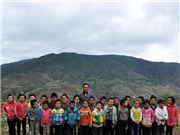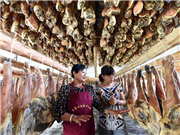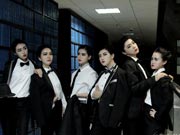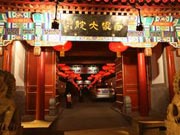

HONG KONG, April 22 -- Hong Kong government on Wednesday revealed a constitutional reform package designed for election of the Special Administrative Region(SAR)'s next top leader by universal suffrage in 2017.
Accompanied by all government principal officials, Chief Secretary Carrie Lam announced the "one person, one vote" chief executive election package in front of all lawmakers at the SAR's Legislative Council(LegCo).
Chief Executive Leung Chun-ying said earlier on Wednesday that "today is an important milestone for Hong Kong's democratic development".
Leung said that the package was in line with the Hong Kong Basic Law, the SAR's constitutional document and China's top legislature's decision on Aug. 31 last year, and he hoped the Hong Kong society including LegCo members could support the package to realize universal suffrage.
In delivering her speech at the LegCo, Carrie Lam said candidates for the next chief executive will be picked by a 1,200- member nominating committee which will be from four sectors consisting of 38 sub-sectors similar to a 1,200-member committee that elected the current chief executive in 2012.
Lam described the universal suffrage for the first time in Hong Kong history as "not only a great leap forward for Hong Hong's constitutional development, but also a historic moment for our country."
HOW UNIVERSAL SUFFRAGE WORKS
In general, the nominating procedures prior to a public vote should be divided into two stages, namely the stage of "members recommendation" and the stage of "committee nomination".
Firstly, a potential candidate could be recommended by at least 120 and at most 240 members of the nominating committee, and each nominating committee member could only recommend one person.
Therefore, at least five and at most 10 persons would come out to seek nomination.
Secondly, the nominating committee should finally select two to three chief executive candidates through a secret ballot vote.
Each nominating committee member may vote for at least two persons seeking nomination. The two to three persons who have the highest number of endorsements by more than half of all nominating committee members will become official candidates.
After that, all 5 million eligible Hong Kong voters may elect the chief executive-elect from the two to three candidates through "one person, one vote" using a first-past-the-post system.
According to the five-step procedure of Hong Kong's constitutional reform, such a proposed universal suffrage package must be endorsed by at least two-thirds of all LegCo members before Chief Executive Leung gives his consent and the top legislature gives final approval subsequently.
The incumbent LegCo has a total of 70 seats. The proposed universal suffrage package needs to secure support from at least 47 LegCo members.
"Today, the government sincerely puts forth specific proposals that have been formulated on the basis of public aspirations as well as the overall and long-term interests of the Hong Kong community," Lam said.
Whether Hong Kong's constitutional development can move forward or will suffer a standstill is now in the hands of every LegCo member, Lam stressed, calling on all LegCo members to examine the proposed package as soon as possible by using their constitutional power.
"This is a call made on you by this era and it is history which places this responsibility on your shoulders," Lam said, adding that she hope that the lawmakers could complete the voting procedures before LegCo's recess this summer.
MILESTONE IN HONG KONG'S HISTORY OF DEMOCRACY
Before being handed over to China in 1997, Hong Kong was ruled by Britain for a total of 155 years during which local residents never had a chance to choose their own leader by universal suffrage.
Under the principle of "One Country, Two Systems,"the Hong Kong Basic Law and relevant top legislature's decisions empower the Special Administrative Region to realize electing its top leader by universal suffrage.
According to Lam, the SAR government collected more than 130, 000 written submissions from different organizations and individuals during the two-month public consultation period which ended in March.
Chief Executive Leung said if such a package is vetoed, he would not be sure when Hong Kong people could have another chance to have universal suffrage since it is not easy to initiate a constitutional reform.
If Hong Kong could implement the universal suffrage in 2017, the next chief executive and the SAR government under leadership will have political mandate required to further promote constitutional development, including the aim of electing all LegCo members by universal suffrage, Lam said.
Carrie Lam told the press on Wednesday that Hong Kong is not an independent political entity, thus the central authorities have the power and responsibility to determine Hong Kong's constitutional development.
The proposed package has introduced more democratic elements and increased the election's competitiveness under the top legislature's Aug. 31 decision, Lam said.
PUBLIC SUPPORT TOWARDS HISTORIC EVENT
During Lam's briefing on the details of the constitutional reform package, more than 1,000 Hong Kong residents gathered in front of the LegCo complex at Admiralty in Hong Kong island, holding banners and shouting slogans to show their support towards the universal suffrage of chief executive in 2017.
"Of course (we) should support universal suffrage. With the right to vote, we can choose the chief executive we like," a 68- year-old retired civil servant surnamed Chan said.
Another Hong Kong citizen surnamed Fong, 58, was also among the demonstrators. He agreed that electing Hong Kong's top leader through "one person, one vote" is an important step forward for Hong Kong's development of democracy. "It is more democratic to have the chief executive chosen by 5 million people than by 1,200 people."
If the proposed package is vetoed by the LegCo, the next chief executive will still be elected by the 1,200-member Election Committee just as what happened in 2012, according to the decision made by the Standing Committee of the National People's Congress ( NPC) on Aug. 31 last year.
Basic Law Committee member Maria Tam Wai-chu said she did not want this happen and hoped members of the legCo and the public would support the government's package.
She said the "one person, one vote" election of the chief executive has never been realized in Hong Kong's history and the notion is worthy of support.
Cheung Chi-kong, executive director of the Hong Kong-based One Country Two Systems Research Institute, said that if the reform package fails to be passed only because some people wanted to continue to be staged in their political soap opera, Hong Kong will lose the opportunity to realize the universal suffrage.
Cheung said that the nomination system can be improved even if there is a wide gap between the opinion of the public and the nominating committee. He noted that the constitutional development should be promoted step by step.
A total of 41 lawmakers of the LegCo on Wednesday publicized a joint statement to showcase their support to the SAR government's proposed package, underlining that the package is in line with the Basic Law and Hong Kong's practical situation.
"We believe that if the universal suffrage package is passed, it will help resolve Hong Kong's long-term dispute on constitutional issues, so as to allow the region to deal with other problems, which conforms to Hong Kong's long-term needs and national interests," the statement said.
The statement also urged the other lawmakers to listen attentively to public voice and respect public opinion since they were selected as public representatives in Hong Kong.
A number of public opinion polls conducted by various associations and organizations in Hong Kong this month showed that around 60 to 70 percent of Hong Kong citizens agreed to realize universal suffrage based on the Basic Law and the top legislature' s Aug. 31 decision.
According to the SAR government, Carrie Lam will lead all principal officials to tap into local communities across the region to seek more public support for the universal suffrage package.
 |
Day|Week

 Tsinghua junior makes over 10,000 yuan a day by selling alumnae's used quilts
Tsinghua junior makes over 10,000 yuan a day by selling alumnae's used quilts Graduation photos of students from Zhongnan University
Graduation photos of students from Zhongnan University A school with only one teacher in deep mountains
A school with only one teacher in deep mountains Glimpse of cultural heritage "Xilankapu"
Glimpse of cultural heritage "Xilankapu" Homemade cured hams in SW China
Homemade cured hams in SW China Breathtaking buildings of W. Sichuan Plateau
Breathtaking buildings of W. Sichuan Plateau Graduation photos of "legal beauties"
Graduation photos of "legal beauties" Top 10 most expensive restaurants in Beijing in 2015
Top 10 most expensive restaurants in Beijing in 2015